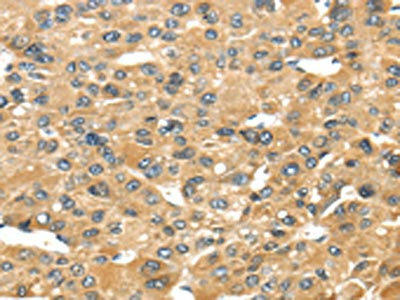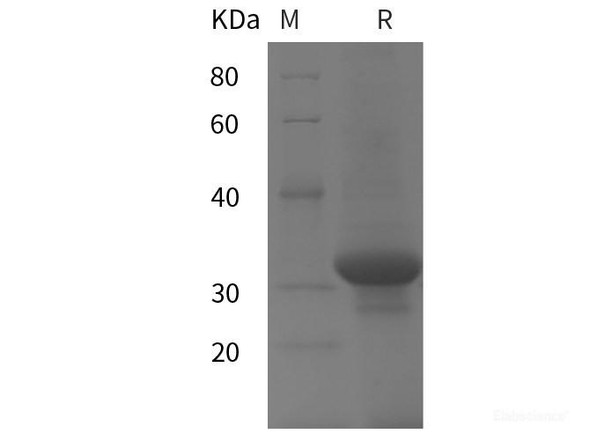UCP1 Antibody (PACO20815)
- SKU:
- PACO20815
- Product Type:
- Antibody
- Reactivity:
- Human
- Host Species:
- Rabbit
- Isotype:
- IgG
- Applications:
- ELISA
- IHC
- Antibody Type:
- Polyclonal Antibody
- Conjugation:
- Unconjugated
Description
UCP1 Antibody (PACO20815)
The UCP1 Polyclonal Antibody (PAC020815) is a valuable tool for researchers studying uncoupling protein 1 (UCP1), a mitochondrial protein involved in thermogenesis and energy expenditure. Raised in rabbits, this antibody is highly specific for human UCP1 and has been validated for use in Western blot applications. By binding to UCP1, researchers can accurately detect and quantify the expression of this key protein in various tissues and cell types, making it an essential tool for studies in metabolism, obesity, and brown adipose tissue biology.
UCP1 plays a crucial role in regulating energy balance and heat production, making it a target of interest in research on metabolic disorders such as obesity and diabetes. By understanding the function and regulation of UCP1, researchers can uncover insights into potential therapeutic strategies for these conditions. The UCP1 Polyclonal Antibody is a valuable asset for unraveling the intricate mechanisms that govern energy expenditure and thermogenesis, with implications for the development of novel treatments for metabolic diseases.
| Antibody Name: | UCP1 Antibody (PACO20815) |
| Antibody SKU: | PACO20815 |
| Size: | 50ul |
| Host Species: | Rabbit |
| Tested Applications: | ELISA, IHC |
| Recommended Dilutions: | ELISA:1:2000-1:10000, IHC:1:30-1:150 |
| Species Reactivity: | Human |
| Immunogen: | Synthetic peptide of human UCP1 |
| Form: | Liquid |
| Storage Buffer: | -20°C, pH7.4 PBS, 0.05% NaN3, 40% Glycerol |
| Purification Method: | Antigen affinity purification |
| Clonality: | Polyclonal |
| Isotype: | IgG |
| Conjugate: | Non-conjugated |
 | The image on the left is immunohistochemistry of paraffin-embedded Human liver cancer tissue using PACO20815(UCP1 Antibody) at dilution 1/40, on the right is treated with synthetic peptide. (Original magnification: x200). |
| Background: | Mitochondrial uncoupling proteins (UCP) are members of the family of mitochondrial anion carrier proteins (MACP). UCPs separate oxidative phosphorylation from ATP synthesis with energy dissipated as heat, also referred to as the mitochondrial proton leak. UCPs facilitate the transfer of anions from the inner to the outer mitochondrial membrane and the return transfer of protons from the outer to the inner mitochondrial membrane. They also reduce the mitochondrial membrane potential in mammalian cells. Tissue specificity occurs for the different UCPs and the exact methods of how UCPs transfer H+/OH- are not known. UCPs contain the three homologous protein domains of MACPs. This gene is expressed only in brown adipose tissue, a specialized tissue which functions to produce heat. |
| Synonyms: | uncoupling protein 1 (mitochondrial, proton carrier) |
| UniProt Protein Function: | UCP1: UCP are mitochondrial transporter proteins that create proton leaks across the inner mitochondrial membrane, thus uncoupling oxidative phosphorylation from ATP synthesis. As a result, energy is dissipated in the form of heat. Belongs to the mitochondrial carrier family. |
| UniProt Protein Details: | Protein type:Membrane protein, multi-pass; Membrane protein, integral; Mitochondrial Chromosomal Location of Human Ortholog: 4q28-q31 Cellular Component: mitochondrion; mitochondrial inner membrane; integral to membrane Molecular Function:oxidative phosphorylation uncoupler activity Biological Process: regulation of transcription from RNA polymerase II promoter; cellular metabolic process; proton transport; brown fat cell differentiation; mitochondrial transport Disease: Obesity |
| NCBI Summary: | Mitochondrial uncoupling proteins (UCP) are members of the family of mitochondrial anion carrier proteins (MACP). UCPs separate oxidative phosphorylation from ATP synthesis with energy dissipated as heat, also referred to as the mitochondrial proton leak. UCPs facilitate the transfer of anions from the inner to the outer mitochondrial membrane and the return transfer of protons from the outer to the inner mitochondrial membrane. They also reduce the mitochondrial membrane potential in mammalian cells. Tissue specificity occurs for the different UCPs and the exact methods of how UCPs transfer H+/OH- are not known. UCPs contain the three homologous protein domains of MACPs. This gene is expressed only in brown adipose tissue, a specialized tissue which functions to produce heat. [provided by RefSeq, Jul 2008] |
| UniProt Code: | P25874 |
| NCBI GenInfo Identifier: | 71153184 |
| NCBI Gene ID: | 7350 |
| NCBI Accession: | P25874.3 |
| UniProt Secondary Accession: | P25874,Q13218, Q4KMZ3, Q68G66, |
| UniProt Related Accession: | P25874 |
| Molecular Weight: | 307 |
| NCBI Full Name: | Mitochondrial brown fat uncoupling protein 1 |
| NCBI Synonym Full Names: | uncoupling protein 1 (mitochondrial, proton carrier) |
| NCBI Official Symbol: | UCP1 |
| NCBI Official Synonym Symbols: | UCP; SLC25A7 |
| NCBI Protein Information: | mitochondrial brown fat uncoupling protein 1; thermogenin; solute carrier family 25 member 7 |
| UniProt Protein Name: | Mitochondrial brown fat uncoupling protein 1 |
| UniProt Synonym Protein Names: | Solute carrier family 25 member 7; Thermogenin |
| Protein Family: | Mitochondrial brown fat uncoupling protein |
| UniProt Gene Name: | UCP1 |
| UniProt Entry Name: | UCP1_HUMAN |
| Antibodies | ELISA Kits |
| Anti-UCP1 Antibody (CAB5857) | Human UCP1 ELISA Kit |
| Anti-UCP1 Antibody (CAB7236) | Human Mitochondrial brown fat uncoupling protein 1 (UCP1) ELISA Kit |
| Secondary Antibody |
| Anti-HRP Goat Anti-Rabbit IgG (H+L) Antibody (CABS014) |
| Recommended Products |
| Anti-FITC Goat Anti-Rabbit IgG (H+L) Antibody (CABS011) |
| Anti-HRP-conjugated Beta Actin Antibody (CABC028) |









